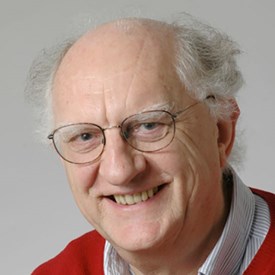John Clarke is a physicist whose research specialties include superconductivity and magnetometers, in particular the theory, design and applications of Superconducting Quantum Interference Devices (SQUIDs), which are ultrasensitive detectors of magnetic flux. He is Professor Emeritus of the Graduate School at the University of California, Berkeley, having previously been Professor of Physics. He was a student at Christ’s, is a former Fellow, and has been an Honorary Fellow of the College since 1997.
John was born in Cambridge and attended the Perse School, then coming to Christ’s to study Natural Sciences and commence his doctoral studies in Physics. He migrated to Darwin College when it opened in 1965 as Cambridge’s first postgraduate college (convenient for its proximity to the Royal Society Mond Laboratory on Free School Lane where his research was based), completing his PhD there in 1968.
He then took up a postdoctoral position in the Physics Department at Berkeley, where he has remained throughout his career. He rose from Assistant Professor in 1969 to Associate Professor in 1971, becoming Professor of Physics from 1973 to 2010 and holding the Luis W Alvarez Memorial Chair for Experimental Physics from 1994 to 1999. Throughout the period 1969-2010 he was also Senior Faculty Scientist in the Materials Sciences Division of the Lawrence Berkeley National Laboratory. He retired in 2010, becoming Professor of the Graduate School at Berkeley and remaining active in research.
He has continued his active affiliation with Cambridge over the years, returning several times including 1972 when he was elected to a Fellowship at Christ’s, 1989 when he was a Visiting Fellow at Clare Hall, and 1998 when he was elected a By-Fellow of Churchill College. He was awarded the ScD from the University in 2003, and he was elected an Honorary Fellow of Darwin College in 2023.
John’s research has mostly involved the fundamental science and applications of superconductivity, including the development of SQUIDs, with applications including condensed matter physics, geophysics, astrophysics, cosmology, medical physics, and quantum information. He has advised over 100 graduate students and postdoctoral scholars, with whom he has published nearly 500 papers.
He was elected a Fellow of the Royal Society in 1986, and was awarded their Hughes Medal in 2004, and was elected a Fellow of the Institute of Physics in 1999, the same year he was awarded the Comstock Prize in Physics from the US National Academy of Sciences, which later elected him an International Member in 2012. In 2015 he was elected a Fellow of the American Academy of Arts and Sciences, and he became a Member of the American Philosophical Society in 2017.
Together with Michel H. Devoret and John M. Martinis, John was awarded the 2025 Nobel Prize in Physics.
Photo credit: Peg Skorpinski

